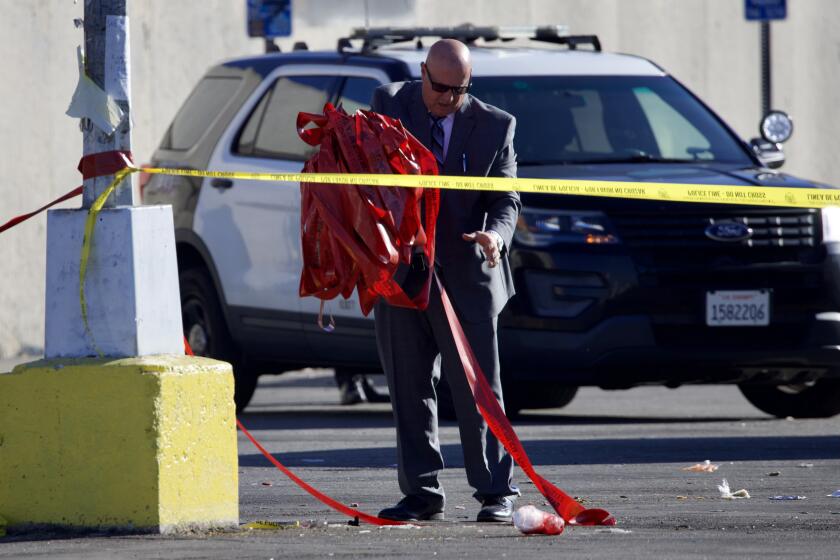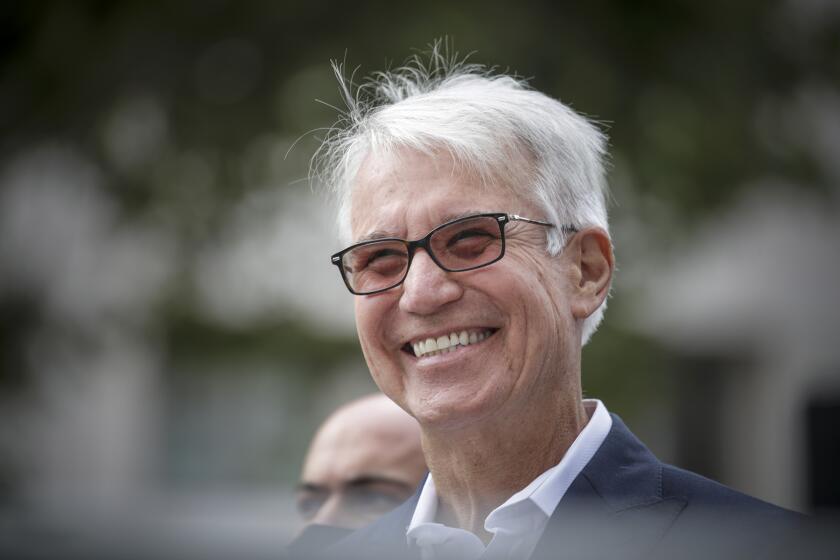Endorsement: Reelect Los Angeles County Dist. Atty. George Gascón

Four years ago, Los Angeles County voters elected George Gascón to take their district attorney’s office in a bold and constructive new direction. They embraced his conviction that a D.A., uniquely, has the power and responsibility to make the justice system more just. They agreed with him that sentences should be just long enough to protect communities and to end cycles of violence, arrest, retribution and recidivism, and not merely to inflict the greatest possible punishment.
They elected him toward the end of a tumultuous year of pandemic, lockdown, police murder, social justice protest, political anxiety and disorder on a scale unprecedented in recent decades. It was a time of both possibility and hazard. L.A. County voters opted for the kind of systemic change that Gascón offered.
From the top of the ticket to local ballot measures, California voters this year are grappling with major decisions that will shape their lives and communities for years to come.
Pushback was immediate and intense, first from prosecutors and police officers who felt threatened by the new approach, and soon after by political opportunists nationwide who used Gascón as a caricature of a criminal-coddling D.A. to stoke fears of crime and disorder.
The blowback continues, even after two recall attempts failed to qualify for the ballot. It seems as if every crime trend, every failure of policing or lawmaking (over which Gascón has no purview) is laid at his feet.
L.A. Dist. Atty. George Gascón is making the criminal justice reforms voters elected him to carry out. Ignore the law enforcement establishment’s resistance and keep him on the job.
Now voters must decide whether to stick with Gascón’s reform orientation or step backward into a failed mindset in which justice is defined by the toughest charges and the longest sentences.
Voters would be wise to step forward, not back. They would be wise to reelect Gascón over challenger Nathan Hochman’s throwback policies.
He is correct about the American justice system: It is precious and unparalleled but falls short of its promise. It dispenses justice unequally, favoring people with financial resources who can, for example, afford to pay bail rather than sit in jail pending trial. It magnifies the racial bias that taints our history and sentences a greater proportion of Black and Latino people more severely, including with the death penalty, than white offenders who committed the same crimes. It too often treats juvenile offenders as if they were adults, failing to consider that their still developing brains should be met with less criminal culpability and greater opportunities for rehabilitation.
Jackie Lacey is not the energetic innovator and leader that the L.A. County district attorney’s office needs. The better choice is George Gascón.
The death penalty is a good example of Gascón’s reorientation of the office. Before he was elected, the Los Angeles County district attorney’s office sought and obtained more death sentences than any of its counterparts around the nation. Even though the state no longer executes people, L.A. County prosecutors still sought the penalty, in part as a signal that they were tough on crime. In doing so, they excluded jurors who opposed death sentences on principle — and who therefore, studies suggest, would have been more skeptical of all evidence against the defendants.
Gascón transformed the conviction review unit, helping to identify, so far, 14 innocent people who were falsely tried, convicted and imprisoned. Their freedom — and the partial redemption of a justice system that grievously failed to do justice — are results of his reform program.
LAPD statistics show that violent crime — including homicides, rapes, robberies and shootings — is down this year, but there’s a lingering sense that the city is getting less safe.
For the record:
4:43 p.m. Oct. 6, 2024An earlier version of this article referred to duplicative sentencing enhancements, such as extra time for a defendant’s use of a gun when the charges already included armed robbery. The robbery statute does not distinguish between armed and unarmed, and the reference has been changed to assault with a firearm.
He adopted policies against gratuitous and duplicative sentencing enhancements, including, for example, extra time for a defendant’s use of a gun when the charges already included assault with a firearm, or for gang affiliation. He requires that juveniles be tried and sentenced in juvenile court, as they should be, and as state law now generally requires, and not adult court, except in rare exceptions.
Gascón’s critics say these “blanket” policies are an abuse of prosecutorial discretion, but they are in fact the opposite. As with the death penalty ban, they are an exercise of judgment and discretion, and a statement to his prosecutors and the public of how his office will do its work. Though he has been criticized for being inflexible, Gascón has permitted the occasional departure from his guidelines when extraordinary circumstances warrant.
Voters have a choice between Dist. Atty. George Gascón and challenger Nathan Hochman, two experienced attorneys with vastly different visions for criminal justice in L.A. County.
Hochman, a former federal prosecutor, has called Gascón the “wrong messenger” of criminal justice reform and argues that he will do a more responsible job of implementing reform policies.
But at the same time he vows to revoke those policies. If he is elected, he says, there will be no ban on the death penalty, sentencing enhancements or trying juveniles as adults.
Two attempts by criminal justice reform opponents to recall Los Angeles County Dist. Atty. George Gascón have failed. Don’t let there be a third. Voters should consider his record after he completes a four-year term.
“I will prosecute to the fullest extent of the law,” he told the editorial board, and “I will not let violent criminals out before they have served their full sentences.” These statements sound like the kinds of “blanket policies” he criticizes in Gascón, although on the “tough on crime” side of the register instead of the “measured justice” side.
Hochman argues that they are not blanket policies and that prosecuting to the “fullest extent of the law” does not mean he will file every charge or seek the longest possible sentence. So then what does it mean?
In the race for district attorney, Hochman is attacking Gascón as soft on crime, but he has his own hurdles, including a lack of name recognition and a past that includes being a Republican in a deep-blue county.
He says it means exercising his discretion to take into account the facts of each case. That’s every prosecutor’s duty.
But in providing guardrails against extreme charges and sentences, Gascón has acknowledged what Hochman has not — that without clear policies limiting filing decisions, hundreds of prosecutors will veer toward the most extreme sentence. Too often, that means veering away from justice. That would be the wrong direction for L.A. County.

















